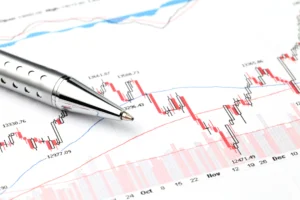Weekend gaps in forex present traders with fascinating yet challenging scenarios each week. When the forex weekend open occurs, traders often witness sudden and significant price movements. These price shifts happen because forex markets close each Friday and resume trading on Sunday evening. Global news and events continue to unfold during this downtime, but market reactions are delayed until trading resumes, creating weekend gaps in forex.
These gaps can seem attractive for quick gains but also pose substantial risks. Traders need to understand forex market volatility and adopt proper gap trading strategies to manage these scenarios effectively. Thorough trading risk management is essential to successfully navigate the complexities posed by weekend gaps.
Understanding Weekend Gaps in Forex
Weekend gaps in forex occur due to the pause in currency trading from Friday evening until Sunday evening. During this interval, global economic news and geopolitical events continue to unfold. Without active trading, these events accumulate without immediate price reactions. Consequently, when the forex weekend open arrives, traders react simultaneously, resulting in significant and often unexpected price jumps.
Forex weekend gaps differ notably from the gaps seen daily in stock markets. Stocks typically gap regularly due to specific corporate news or earnings reports. Conversely, forex gaps result from broader economic conditions and global events impacting entire currencies and markets rather than individual companies.
Why Weekend Gaps Occur in Forex
Forex market volatility significantly influences the creation of weekend gaps. When global events like unexpected economic data releases, central bank policy changes, or geopolitical crises occur, they heighten market uncertainty. The accumulated sentiment during weekends can then cause substantial price movements once trading resumes.
For example, if a critical economic report emerges unexpectedly over the weekend, it might lead traders to rapidly reassess currency values. As soon as the forex weekend open occurs, traders quickly adjust their positions based on the new information, creating large and visible gaps.
Gap Trading Strategies
Successful traders adopt various gap trading strategies to exploit weekend gaps profitably. The two primary approaches include gap fill strategies and momentum strategies, each suited for different market conditions and trader preferences.
Gap Fill Strategies:
- Gap fill strategies assume markets initially overreact to news, leading to exaggerated price movements. Traders following this method anticipate prices will return toward Friday’s closing levels after initial market reactions settle. These traders patiently await clear signals of stabilisation before entering trades, emphasising disciplined trading risk management.
- For instance, after a significant weekend gap, a trader may observe price action carefully. If prices begin reverting towards the previous week’s close, the trader might enter a position expecting a full or partial gap closure.
Momentum Gap Trading Strategies
- Alternatively, momentum gap trading strategies view weekend gaps as signals of powerful and sustained price trends. Momentum traders analyse underlying news carefully to evaluate whether a gap indicates ongoing directional movement. If the market sentiment strongly supports continued movement, traders quickly enter positions aligned with the gap’s direction.
- Momentum strategies can provide substantial rewards during clear directional moves. Traders should, however, ensure stringent trading risk management to protect themselves from potential reversals or false signals.
Forex Market Volatility in Gap Trading
Forex market volatility plays a crucial role in weekend gap formation and trading. High volatility increases the potential size and unpredictability of gaps, while lower volatility usually results in smaller, less impactful gaps.
Understanding volatility helps traders anticipate potential market scenarios effectively. High-volatility weekends, often caused by significant geopolitical events or unexpected economic reports, may necessitate a more cautious trading approach. Conversely, lower-volatility periods might allow traders more flexibility to adopt less aggressive gap trading strategies.
Essential for Handling Weekend Gaps
Trading risk management remains a fundamental practice for traders dealing with weekend gaps in forex. Due to the unpredictable nature of these gaps, traders face significant risks like slippage, where prices may gap beyond stop-loss levels.
To mitigate such risks, traders commonly adopt specific measures:
- Reducing position sizes before weekends to minimise potential losses.
- Implementing wider stop-loss levels to account for large price movements.
- Avoiding highly leveraged positions during weekends.
Effective trading risk management not only protects traders’ accounts but also ensures sustainable long-term profitability.
Technical Analysis After Weekend Gaps
Weekend gaps often necessitate significant adjustments in technical analysis. Established support and resistance levels might shift drastically, requiring traders to reassess and redraw their technical charts. Traders use tools like Fibonacci retracements, moving averages, and the Relative Strength Index (RSI) to better understand post-gap market behaviour.
Combining technical analysis with fundamental insights provides a comprehensive approach. Traders using this integrated analysis can better predict price movements and make informed trading decisions.
Liquidity Considerations
Liquidity tends to be significantly lower at the forex weekend open compared to typical market hours. Reduced liquidity often leads to wider spreads, increasing execution risks such as slippage or unfavourable fills.
Traders must prepare for these challenges by employing strategic execution methods. Limit orders and smaller trade sizes can help manage risks effectively during these low-liquidity periods, ensuring traders do not experience excessive adverse price execution.
Psychological Aspects of Trading Weekend Gaps
Trading weekend gaps in forex involves significant psychological challenges. Traders often encounter emotions like fear, greed, excitement, and anxiety when faced with sudden market movements. Emotional decision-making can lead to errors, impulsive trades, or deviation from trading plans.
Successful gap traders emphasise emotional discipline, employing structured trading strategies and rigorous risk management practices. Regular journaling of trades and emotional states helps identify patterns, enabling traders to manage psychological pressures effectively and improve decision-making over time.
Automated versus Manual Gap Trading
Automated trading systems offer efficient execution and remove emotional biases from trading decisions. Algorithms quickly analyse market data and execute trades immediately when markets reopen, ensuring consistency and speed.
Manual traders, however, provide invaluable flexibility and nuanced analysis, interpreting subtle market signals and context that automated systems might overlook. A blended approach combining automated execution with human insight can offer optimal results, particularly during volatile weekend gaps.
Your Essential Guide to Gap Trading Success
Thorough preparation is critical for successful gap trading. Here’s how traders can effectively prepare:
- Review Economic Calendars:
Carefully examine upcoming economic events scheduled over the weekend. Knowing what’s ahead helps traders predict potential gaps. - Monitor Weekend News Closely:
Regularly check news sources during weekends to stay updated on economic developments, geopolitical events, and market sentiment shifts. - Adjust Positions Strategically:
Evaluate your open trades before markets close on Friday. Consider closing or scaling back trades to reduce risk exposure from weekend volatility. - Plan for Multiple Scenarios:
Anticipate various market outcomes. Create action plans for different potential gap scenarios to respond confidently when trading resumes. - Maintain Discipline and Confidence:
Proper preparation enhances emotional control and discipline. Traders who plan thoroughly enter the forex weekend open with clarity and reduced anxiety.
Consistent and structured preparation helps traders handle weekend gaps effectively, ensuring informed decisions and improved profitability.
Learning from Every Weekend Gap
Each weekend gap is a valuable learning experience. Traders can continually enhance their skills by following these detailed steps:
- Document Each Trade Clearly:
Carefully record details of every gap trade, including entry and exit points, reasoning behind trade setups, and trade outcomes. - Analyse Market Conditions:
Note the specific market context surrounding each gap, such as news events, economic indicators, and overall market sentiment. - Reflect on Emotional Responses:
Capture your emotions during each trade, whether it is anxiety, excitement, or confidence. Understanding emotions improves psychological resilience. - Review Regularly:
Schedule consistent reviews of your trading journal to analyse performance patterns, pinpoint successful strategies, and recognise common mistakes. - Adapt and Improve:
Use insights gained from each review to refine your trading methods, strengthen risk management, and enhance decision-making skills.
Continuous documentation and reflection transform weekend gaps from mere market events into powerful learning opportunities, fostering long-term trading success.
Avoiding Common Gap Trading Pitfalls
To successfully navigate weekend gaps, traders must recognise and avoid typical pitfalls by following these guidelines:
- Prevent Overtrading:
Trade selectively by clearly defining your entry criteria. Resist the temptation to trade every gap without proper analysis. - Prioritise Risk Management:
Always adhere strictly to risk management strategies, setting appropriate stop-loss levels and managing position sizes carefully. - Control Emotional Decisions:
Avoid impulsive or emotional trades. Maintain discipline by following predefined trading plans, regardless of immediate market pressures. - Ensure Adequate Preparation:
Never enter gap trading sessions unprepared. Thoroughly review market conditions and potential scenarios before the market reopens each weekend.
Avoiding these pitfalls through consistent discipline, preparation, and emotional control ensures sustainable trading performance during weekend gaps.
Building a Personalised Gap Trading Strategy
Developing a personalised strategy tailored specifically to your needs and strengths significantly enhances weekend gap trading effectiveness:
- Assess Personal Risk Tolerance:
Evaluate how much risk you’re comfortable accepting. Align your gap trading methods to match your personal risk profile. - Identify Your Trading Style:
Determine whether you prefer short-term gap fill strategies or momentum-driven trades. Match your chosen approach to your personal strengths. - Experiment with Demo Trading:
Test various gap trading strategies in a demo account environment first. This practice allows you to gauge their effectiveness safely. - Analyse Outcomes Regularly:
After testing, review trade performance comprehensively. Identify which methods yield consistent results and which require adjustments. - Refine Your Strategy Continuously:
Regularly incorporate feedback from your trading experiences. Make strategic refinements based on insights gained from ongoing analysis.
By methodically crafting, testing, and refining personalised gap trading strategies, traders can achieve greater consistency, profitability, and confidence over time.
Conclusion
Weekend gaps in forex offer both enticing opportunities and substantial risks. Traders equipped with proper gap trading strategies, a thorough understanding of forex market volatility, and rigorous trading risk management practices can successfully navigate these challenges.
By emphasising disciplined preparation, emotional control, and continuous learning, traders can confidently handle weekend gaps. Ultimately, traders who approach weekend gaps methodically and thoughtfully turn potential dangers into consistent and profitable opportunities.
Read here to learn more about Trading During News Events What Every Trader Should Know

I’m Chaitali Sethi, a financial writer and market strategist focused on Forex trading, market behaviour, and trader psychology. I simplify complex market movements into clear, practical insights that help traders make better decisions and build a stronger trading mindset.




